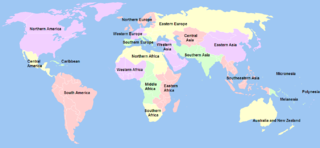Related Research Articles

Trans-Tasman is an adjective used primarily to signify the relationship between Australia and New Zealand. The term refers to the Tasman Sea, which lies between the two countries. For example, trans-Tasman commerce refers to commerce between these two countries.

A subregion is a part of a larger region or continent. Cardinal directions are commonly used to define subregions. There are many criteria for creating systems of subregions; this article is focusing on the UN statistical geoscheme, which is a changing, constantly updated, UN tool based on specific political geography considerations relevant in UN statistics.
Ash Amin, is a British academic known for his writing on urban and regional development, contemporary cultural change, progressive politics, and the collaborative economy. He holds the 1931 chair at the Department of Geography, University of Cambridge. Since September 2015 he has held the post of foreign secretary of the British Academy.

Joshua Gans holds the Jeffrey Skoll Chair in Technical Innovation and Entrepreneurship at the Rotman School of Management, University of Toronto. Until 2011, he was an economics professor at Melbourne Business School in Australia. His research focuses on competition policy and intellectual property protection. He is the author of several textbooks and policy books, as well as numerous articles in economics journals. He operates two blogs: one on economic policy, and another on economics and parenting.
Zoltan J. Acs is an American economist. He is Professor of Management at The London School of Economics (LSE), and a professor at George Mason University, where he teaches in the Schar School of Policy and Government and is the Director of the Center for Entrepreneurship and Public Policy. He is also a visiting professor at Imperial College Business School in London and affiliated with the University of Pecs in Hungary. He is co-editor and founder of Small Business Economics.
John Sullivan Wilson is a former Lead Economist (retired) of the World Bank. He directed and managed research on transparency, trade facilitation, regulation, and economic development. Mr. Wilson served in the Development Research Group of the World Bank and also in operations in the Infrastructure Vice Presidency.

LX Pantos Co., Ltd. is a global logistics service provider based in Seoul, South Korea. Since its inception in 1977, LX Pantos has evolved from an air freight agent, to include all logistics services including: sea freight, air freight, road and rail freight, warehousing, logistics consulting, international express, project cargo, terminal service, and customs clearance.
John Braithwaite is a Distinguished Professor at the Australian National University (ANU). Braithwaite is the recipient of a number of international awards and prizes for his work, including an honorary doctorate at KU Leuven (2008), the University of Louisville Grawemeyer Award with Peter Drahos for Ideas Improving World Order (2004), and the Prix Emile Durkheim, International Society of Criminology, for lifetime contributions to criminology (2005).
Peter Dauvergne is an author and environmentalist. He is Professor of International Relations at the University of British Columbia.
Gernot Grabher is an economic geographer and Professor of Urban and Regional Economic Studies at the HafenCity University Hamburg. He received his Ph.D. in 1987 at Vienna University of Technology, and held positions at the Wissenschaftszentrum Berlin (WZB), King's College London, the University of Konstanz and the University of Bonn. Grabher was Visiting Professor at Columbia University, Copenhagen Business School, Santa Fe Institute, Cornell University and the Institute of Advanced Study in the Behavioral Sciences. Between 2007 and 2011 he was co-editor of Economic Geography. Currently, he is co-editor of the Regions and Cities book series of the Regional Studies Association. Gernot Grabher is internationally renowned for his research on networks, regional evolution and decline, and project organization.
Harold Chillingworth Brookfield was a British and Australian geographer specialising in the analysis of rural development, small-scale societies, family farming, and the relationship between land use and society in developing countries. He retired from the Australian National University in 1991.
Ruth B. Fincher is a leader in the field of feminist geography and urban geography. She is an Emeritus Foundation Professor of Geography at the University of Melbourne, Australia.
Tim Stephens is Professor of International Law at the University of Sydney and Fellow of the Australian Academy of Law. Stephens' main areas of research are the international law of the sea and international environmental law.
Ngai-Ling Sum is a British sociologist and political economist and co-director of the Cultural Political Economy Research Centre at Lancaster University.
Raymond Frederick Watters was a New Zealand geographer. He conducted interdisciplinary studies and projects for UN agencies, British Overseas Development Administration, NZ Aid and governments of a number of developing countries including Solomon Islands, Kiribati, Tuvalu, Mexico, Venezuela, Peru and Papua New Guinea.

Eliahu "Eli" Stern is a professor emeritus of geography and planning, in the department of geography & environmental development at Ben-Gurion University of the Negev, Israel, and former secretary of the IGU Commission of Applied Geography.
Raymond L. Bryant is a British-Canadian geographer and Professor Emeritus of Political Ecology at King's College London. He is known for his founding contributions to the interdisciplinary field of political ecology.
Katharyne Mitchell is an American geographer who is currently a Distinguished Professor of Sociology and the Dean of the Social Sciences at the University of California, Santa Cruz.

John Rennie Short is professor emeritus of geography and public policy in the School of Public Policy at University of Maryland, Baltimore County.
Leslie Young was a New Zealand–Chinese economist. His interests included uncertainty in international trade, and the influence of culture and political economy on economic performance. He was the executive director of the Asia Pacific Institute of Business from 1993, and was a long-serving member of the American Economic Review editorial board.
References
- ↑ 50 Years of Commonwealth Scholarships New Zealand 1959-2009 (New Zealand Vice-Chancellors’ Committee, 2009), p. 8. https://www.universitiesnz.ac.nz/files/u12/NZVCC_Conf_Book_WEB.pdf
- ↑ P.J. Rimmer, New Zealand Seaports (PhD, University of Canterbury, New Zealand, awarded 1966). Two volumes available at https://ir.canterbury.ac.nz/items/781f57de-974b-4b9a-a4f9-112f48c96e91 Peter J. Rimmer, "Recent Changes in the Status of Seaports in the New Zealand Coastal Trade", Economic Geography Vol. 43 (3), July 1967, pp. 231-243.
- ↑ Asian-Pacific Rim: Developmental State and Regional Integration. Volume One The Japanese Ascendancy. Volume Two Integrating the Asian-Pacific Rim (DLitt, Australian National University, awarded 2006).
- ↑ Peter J. Rimmer and Howard Dick, "Economic space for transnational infrastructure: gateways, multimodal corridors and special economic zones" in Biswa N. Bhattacharyay, Masahiro Kawai, Rajat Nag eds., Infrastructure for Asian Connectivity, Cheltenham, UK: Edward Elgar Publishing, 2012, pp. 217-253.
- ↑ https://socialsciences.org.au/academy-fellow/?sId=0032v000033l9WpAAI (accessed 26 October 2023).
- ↑ https://www.iag.org.au/previous-iag-awards (accessed 26 October 2023).
- ↑ https://honours.pmc.gov.au/honours/awards/1134780 (accessed 26 October 2023).
- ↑ https://rgsq.org.au/resources/Site/Society/J.P.%20Thomson%20Medallists_web.pdf (accessed 26 October 2023).
- ↑ "Remembering Lisa Drummond – YCAR".